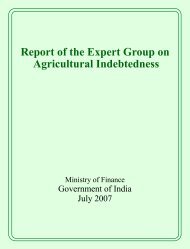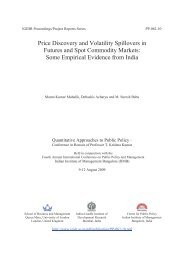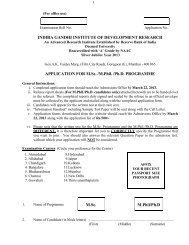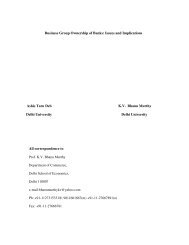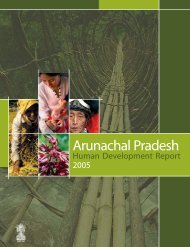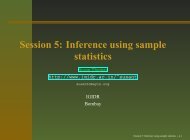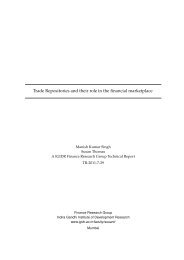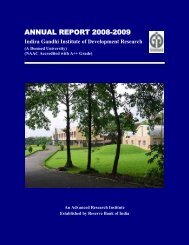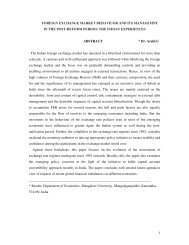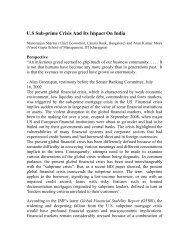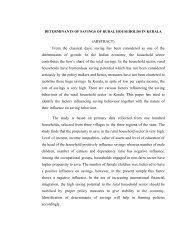National Human Development Report: 2001 - Indira Gandhi Institute ...
National Human Development Report: 2001 - Indira Gandhi Institute ...
National Human Development Report: 2001 - Indira Gandhi Institute ...
- No tags were found...
Create successful ePaper yourself
Turn your PDF publications into a flip-book with our unique Google optimized e-Paper software.
NATIONAL HUMAN DEVELOPMENT REPORT <strong>2001</strong> GOVERNANCE FOR HUMAN DEVELOPMENT 129entire social sector programme of the Central and the State Governmentsrests largely on the ability of the civil administration to deliver. It willcontinue to be so till the PRI bodies find their feet under the newConstitutional provisions. More than the increase in resources, social sectordevelopment needs major reforms in the delivery systems.In the area of civil service reforms, the Government faces manycritical challenges. At the base of it, there is a need to review the verystructure, the composition, the functioning and the ultimate role of civiladministration system in development of the country. It has to be realisedthat a system that had roots in the requirement of a colonial polity andentrusted with the task of maintaining status-quo in the society cannot beentirely suitable for initiating, formulating, implementing and evencatalysing developmental activities in a growing economy. A controlorientedsystem has to give way to a growth-oriented set-up. This requiresclear demarcation of responsibilities between the law and order machineryand the machinery entrusted with the task of catalysing development inpartnership with local level self-governing bodies. The coordination ofdifferent public and para-statal agencies engaged in development is criticalfor getting the most out of limited resources, for minimising overheads andchecking duplication of effort. Moreover, excessive loading of responsibilitieson some branches of civil administration, for instance, the DistrictCollectorate which has been reported to be overseeing 167 developmentschemes at the block level in oneinstance, not only undermines theCivil Society Initiatives in Community <strong>Development</strong>overall institutional capacity todeliver but also compromises on theThere are many successful community development initiatives, in various parts ofquality of public interventions inthe country, founded on a unique partnership of the local people with the Statewhat are clearly the critical areas ofGovernments, often catalysed and mediated by some motivated individuals andhuman development. To a largeNon-Governmental Organisations (NGOs). The recent success of such initiatives,extent, the task of the developmentparticularly in the area of water shed management and minor irrigation in theadministration would become easierStates of Gujarat, Rajasthan and Maharashtra, to name a few, have considerablyif procedural steps are taken to makeimproved the income levels of the people and strengthened the capacities of theavailable information, as a matter ofcommunities to become self reliant in addressing their development concernsright, to the citizens. In this context,locally. More importantly, it has fostered a sense of ‘ownership’, ‘responsibility’there is a strong case for aand ‘progress’ among the people.replacement of ‘Official Secrets’ ActIn the Saurashtra region of Gujarat, in a span of just five months, prior toby ‘Right to Information’ Act.the monsoon in the year 2000, more than 2,000 villages in six districts have builtAn important aspect of the10,000 check dams in response to the State Governments ‘Build Your Own Checkreform requires enhancing theDam’ (BYOD) scheme. The Government has contributed 60 per cent of the totalproductivity of civil service andcost of the dam, the villagers have shouldered the remaining through voluntarymaking certain that each employeework. The success of the initiative can be assessed from the fact that despite lessis performing socially relevant tasks.than normal monsoon in the area, 7,000 of these check dams overflowed at leastThere have to be incentive structureonce. The result was a higher water table in the entire region.that rewards and promote merit,The story is much the same in parts of Rajasthan and in Maharashtra wherediscipline malfunction andsimilar efforts have been undertaken by some individuals and NGOs. Among others,misconduct, and improveMadhya Pradesh has recently launched an innovative and affordable communityaccountability and performance.oriented food and water security movement based on the principle that the StateThere is a case for opening theshould provide an enabling environment to everyone to earn a livelihood.higher ranks of civil services toThere is a fair amount of consensus, among the experts and thecontractual fixed tenureimplementors of public policy and programmes, that it is only a decentralisedappointments, with a view to havecommunity-centred approach that can overcome scourge of hunger and poverty.responsible, and informed



